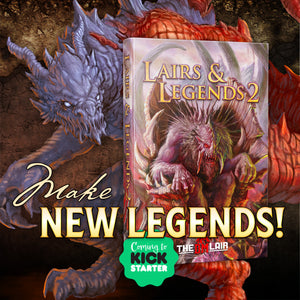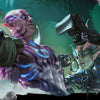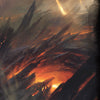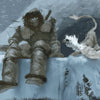How to Run a D&D Nautical Campaign
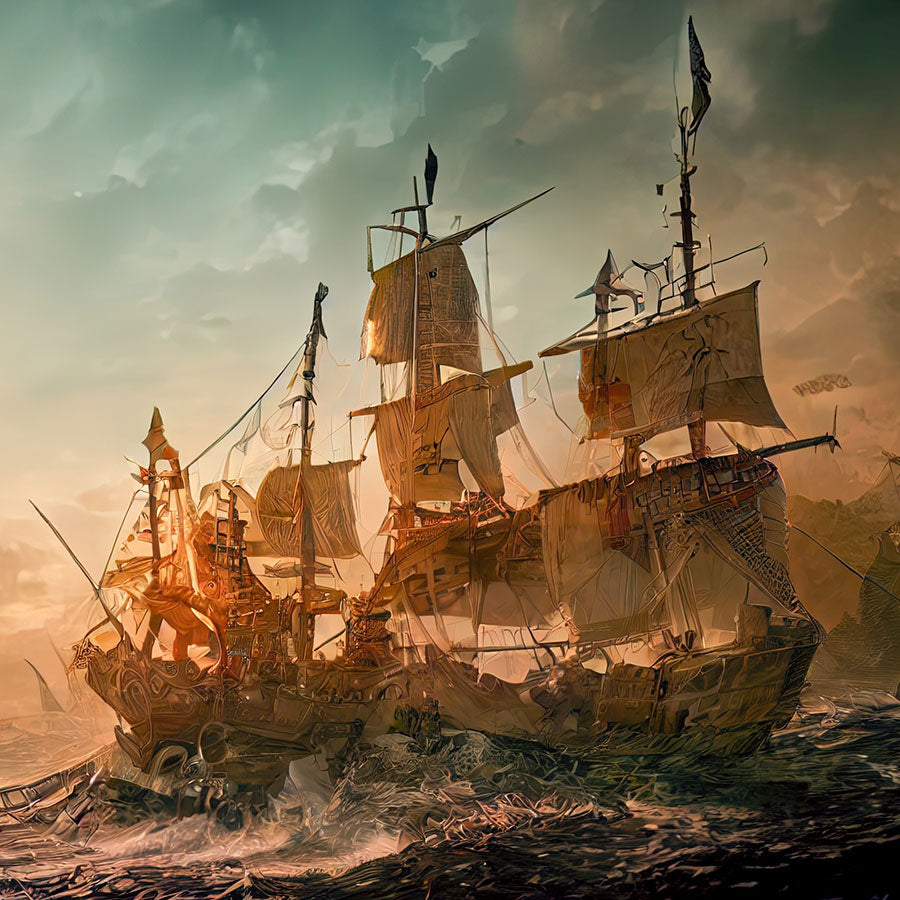
Today we discuss the five most common pitfalls to running a nautical or sea-based campaign in Dungeons & Dragons, and what you should do instead.
Grab our nautical ruleset in Maritime & Madness and get rules for ship and crew components, crafting unique ships, roles for crewing a ship, and ship-to-ship combat.
Watch or listen to this article by clicking the video below.
#1 A String of Random Encounters
Number one, just having a string of random encounter after random encounter. This pitfall is basically just having the campaign focus on the group sailing around a ship all the time and basically just running into random encounter after random encounter. I mean, look, just because you're running a nautical campaign doesn't mean the group isn't allowed to step foot off their ship, but campaigns run this often feel like the DM is just rolling on random coastal encounters or random underwater encounter tables from Xanathars every so often, and then just slicing those encounters together, maybe putting some story around them, whatever comes to mind, or maybe plan in advance and then pretending like it's an actual D&D campaign. Of course, maybe they are actually planning it all out and it just happens to be that it feels like it's just random encounter after random encounter.
Whether it's intentional or not intentional, it still is delivering a less satisfying game experience for most players, I feel, because the thing is that whether you're on the sea or whether you're on land, you are still running Dungeons & Dragons. Nothing has changed about the core mechanics of the game and what makes the game satisfying. I mean, just because it's a nautical campaign doesn't mean that we just suddenly started playing a different game or something. What kind of D&D game, what kind of groups have you played in where there's really just a series of random encounters all strung together? There's no adventures as we typically know them. There are no castles to explore. There are no crypts to cleanse. We really just have a bunch of random encounters, one after the other strung together. It's possible some of you have played in games like that or maybe even run games like that, and if you have, I'm not really getting on your case a whole lot because hey, everybody can always improve.
Now I am making the assumption that those games are subpar and substandard and perhaps not as optimal and fun for people because I don't think they are. So we still want to have standard adventures in the game just like we would have on a land-based campaign. The only real difference here is, well, I mean there are other differences too, but the big difference is the backdrop instead of the land being in the background, it's the sea and islands in the background and underwater in the background or underground. It's like instead of the underdark, you have the underwater in a nautical campaign, right? So anyway, when we're going from point A to point B, it's by ship and C, not by horse and land. Even though I wonder how many D&D groups actually use horses in their games. I've run D&D for a long time and I could probably count on two fingers on half of a hand.
How many groups actually get horses when they travel because many of them just walk, but you're not going to swim in a nautical campaign. You probably need a boat or a dinghy or something to get around, otherwise it's probably not going to work. So there should still be adventures or dungeons in the game. And when I say dungeons, all I really mean is a location-based adventure. It's just kind of a term we have around here for yeah, that. Anyway, what do I mean by that? What do I mean by adventures or by dungeons? An adventure dungeon plays itself in stark contrast to what we just got done discussing the random string of encounters that are all just kind of loosely tied together by some vestiges of a story. Instead, an adventure takes place usually in a location and has a very strong premise or story or plot or situation that ties it together.
For instance, in my Sword Coast Guard game, the group once went on an adventure against the Velvet Fists. I actually published that adventure over on my storefront if you're interested in getting it. The group had to go into this thieves guild essentially, and there were some former companions of one of the characters that were running this thieves guild, and they had also kidnapped and taken hostage one of the characters friends from before. They were an adventurer back from their backstory, and so they had to go into the Thieves Guild, basically overthrow the Thieves Guild, stop all the bad things that they were doing and rescue this character's friends. And so they go into the Thieves Guild and they go about doing this. They discover that there was an underground area, there were some dungeons so to speak, or just some underground areas that they had built beneath their thieves guild, and they had to explore those.
They found a bunch of demons down there, and of course they had to confront the demons, wipe out the demons, finally find this character's friend rescue her and all of her companions that were down there that had been taken hostage by the Thieves Guild. And that is what I mean by an adventure, a location-based adventure where there is a premise, there is a situation that's going on in this case, a thieves guild doing bad things and kidnapping people and then the adventurers have to go solve that thing. We're not just stringing it together. Random encounter after random encounter, we have designed an adventure. We've designed a situation that our players are now going to encounter and figure out a way to overcome. So for a nautical campaign, we take that same idea and we just transport it over into a sea-based setting. Now, in a sea-based campaign, we have different things that can serve as locations for adventures or dungeons.
You have shipwrecks under the water where the party goes down to a shipwreck, explores the shipwreck, which has a bunch of different rooms in it. There could be a little cave system underneath it or nearby as well. That's where the bad guys are hiding out because they're the ones that were responsible for the ship being wrecked. And now you got a shipwreck and then you find the bad guys and it's a whole adventure. You could have underwater buildings and constructions. An island had like a castle or a keep fortified upon it. The island somehow sank down below and now it is down beneath the waves and you got to go down there and explore things and figure something out. Obviously you need some bad guys and some things that are going on you need to have a conflict to solve, but it's still a location where things can take place.
You can have small islands or large islands. There can be buildings on those islands, there can be cave systems on the islands. Ships themselves serve as really good locations for adventures because they are multi-room structures that things can happen in. So you have all of these really cool adventure locations where our adventures can take place, and so then you just populate them with situations, quests that the adventurers need to go on resolve problems in the game world. For instance, they might have to retrieve lost treasure from the shipwreck, but it's guarded. Of course, they might need to explore an underwater cave system, chart it out and all that kind of stuff where local merchant who is interested in it for reasons that the local merchant isn't very revealing, that's probably a better way to say that. They might need to investigate the island where a dragon turtle is rumored to hide its vast treasure hoard and grab the treasure if they can.
Any and all sorts of adventures can take place at these locations. By the way, if you're unsure how to make an adventure, I have a playlist titled D&D Adventure Creation that walks through pretty much everything you need to know about creating adventures.
Now in the examples above, I was referencing locations for adventures because almost all the adventures in D&D are what we call location-based adventures. However, there are also event-based adventures, which are way more rare because they're not only more challenging to design, but also to run at the game table. Now in that same D&D Adventure creation playlist, I have a video that runs down how to create event-based adventures too, if you're interested.
#2 Bad Naval Combat
Number two, running Crappy Naval Combat. Yes, I know we just talked about focusing on running adventures, but it's still a nautical campaign and naval combat is almost assuredly going to come up at some point. Having naval combat between two ships where your characters, the players control one of the ships and the bad guys control another ship can be a really amazing part of the game. If you do it all the time and it's every single game session, it's going to get boring after a while. But imagine how sad it would be, how horrible and depressing it would be to have an entire nautical campaign where you never have ship-to-ship combat. It's never a thing, you just skip over it and sailing from point A to point B is just kind of like a hand wave and there's never any. It's just woo, no attacks, no ships, no battle, no nothing.
Yeah, why run a nautical campaign if you're never going to have ship-to-ship combat? It would also be equally depressing and sad if you have naval combat be a drudgery and a slog and the worst part of the campaign. Imagine you have a rule set that is so overly complex that every time there's ship-to-ship combat, it gets just downright boring and horrible, and everybody groans. I once played a star Trek game, I forget the name of it exactly, but you literally controlled, each player controlled a ship, a star Trek ship, and the whole game, and it took like hours to play this game, but the whole game consisted of these two ships battling each other and you would take rounds and turns shooting missiles, shooting your photon torpedoes and things like that, and it would take a long, long time. The rules were super intricate, super complicated, and it just took time.
I mean, I got my butt handed to me, totally got destroyed in that game, but I remember it taking us a couple hours at least to just play out this one battle. Now the thing is, that was the game. That was the purpose of the game, but when you're looking at D&D, the purpose of D&D is not just to spend a couple hours or more having two ships fight each other with super complex rule sets. It can be a feature, it can be something that you do in an alpha campaign, but you don't want to have it take up crazy amounts of game time unless that's what your players really enjoy. Thus, we need a rule system for enable combat. We need something that is not heavy, that is not long, that is not complex. We don't want rules that are difficult to use because we know that players are not going to read a 300 page rule book on naval combat.
They're not going to do it if you give them a three page rule book on naval combat, they might read it, but you're still going to end up having to explain most of it to them and walk them through the rules, and then every single time naval combat comes up again, everybody's going to have forgotten the rules and you're going to have to re-explain it to them. Come on, we know how this works. At the actual game table, you cannot have a crazy complex set of rules that rarely get used because every single time you go to use them again, you're going to have to re-explain everything, and if they're super complex, it's going to take forever and it's going to be an amazing downer on the game. So when you need rule sets for edge cases like naval combat or siege combat, you don't want big books.
If you're going to have armies battling each other, you don't want crazy complex rules. You don't need a 300 page book. You need something that is very short, very concise, gets right to the point that you can easily implement at the game table, explain to your players, play it, and then go back to the normal game of D&D and then three months later when it happens again, it's easy to re-explain, and pick it up and have your naval combat. And this is precisely why in the December issue of Lair Magazine, Maritime and Madness, my team and I published Sailing the Seas, a maritime supplement. It's a lightweight rule set that you can use to incorporate ships and naval combat into your game. Instead of just giving you specific types of ships and their stat blocks, we developed a system that allows you to build custom ships for your game.
First, you choose the size of your ship, dinghy, small, medium, large, huge or gargantuan. Then you choose the different components you want to have on your ship, armor, ballista, battery cannon, battery, cargo, hold, crew quarters, dinghy and oars. Each size category of the ship allows a different number of components of course, and then we break down the roles on the ship. Captain first mate, gunnery, chief navigation, master rigger, boat, swing cook, and Sergeant at Arms noting that each rule also has a unique action they can take in combat. Now the adventurers themselves can take on these roles or they can hire crew to do so. Finally, we go over the steps for running naval combat and how to do it during the game.
Oh, and we also include in an adventure arc the Seas of Tasselbrook that has three adventures designed for levels eight, nine, and 10 in it, the Rescue of the Blind Renegade problems of Piracy and into the Depths.
#3 Ignoring the Nautical Backdrop
Number three, not capitalizing on the nautical backdrop. Remember how I said before that you're just running a standard D&D game? Well, you're also not just running a standard D&D game. I mean, you are at sea. You travel by ship from island to island. Adventures take place underwater at times. You engage in naval combat. There are clearly things that are different from a regular D&D campaign, so make sure that you emphasize them and describe them. Well, here are some things that you should consider adding to the game either for flavor or mechanically or both.
By mechanically, I mean there are actual rules when they encounter these things that help you resolve them at the game table. First of all, you can have hazards that come up as they travel. You could have crew conflict either among themselves or mutiny against the adventurers. Imagine how cool that would be. Like they're traveling on their ship and all of this stuff, and then suddenly there's an uprising of the crew against the adventuring group. Now, you couldn't do that too frequently, but once doing a campaign that could be really cool and you'd want to foreshadow it a little bit with unrest and unease and perhaps base it upon decisions the adventurers make, like if they're not paying their crew properly or they're taking unnecessary risks and they're not being compensated appropriately, then there could be some distress unrest and eventually culminate a mutiny, and that could be a really cool thing that happens in your campaign.
There could be other things like fog that they have to navigate through, and perhaps there are reefs or underwater rocks as well that could threaten them as they travel through the fog. Fire on a ship might be a terrifying thing. Of course, there's water all around you, so once you discover it, I imagine you can probably put it out pretty quickly, but if left undiscovered or if it gets into your rigging or your sails, that could be a serious problem and it might indicate sabotage from somebody on the crew or from some underwater opponents that are intentionally setting your ship ablaze to create problems for you while they do something else quite nefarious to your ship. You can have infestations of rats or other critters aboard the ship. How about beetles that get into all of your rice or flour stores? That's nasty. I once lived in Central America and I bought beans from the store and they were full of little beetles, and in my defense, I was very broke.
I had almost no money at all. I was living in Central America as a missionary and was super broke and stuff. I tried to get as many of the beetles out of the beans as possible, and I still cooked them and I still ate them because I was super broke. You do what you got to do. And then obviously we're at sea, so we could have storms, massive waves there, just rain or lightning, all of these sorts of things that you can deal with as well. How about a crazy whirlpool that is sucking the ship down and maybe they fight their way out, maybe they're unable to, maybe they fail some rules and they end up going down the whirlpool, the ship gets sunk down below and they discover an underwater kingdom perhaps. I don't know, maybe that's cliche, but you could figure out something probably cooler than that, right?
The next thing here is that you want to consider different ocean environments and how to describe them and incorporate them into your game. I mean, we have lots of really cool things that you could come across when you're on a nautical campaign. When you're adventuring across the seas or when you're going on islands or when you're going beneath the waves, you have coral reefs. Bad guys could be hiding them using them as a base or they could just present hazards to your ship as it travels. You could have blue holes, which I had to look this up actually. I was reading about hazards in the ocean, and I found something called blue holes, and I'm like, what is a blue hole? A blue hole? It's part of the ocean bed that basically sinks down and forms a sinkhole. Imagine the type of bad guys or monsters or a kraken or something crazy or just some sort of adventure that could take place down in a blue hole.
It opens up into a cave complex. It's a sinkhole and things are collapsing and sinking and stuff. It could be really cool. Obviously you could contend with currents. You also have depth at work in underwater adventures too. There's something called the sunlight zone where sun penetrates and you can mostly see, and then there's the twilight zone. The twilight zone is where there's a little bit of sun still getting through, but it's pretty dark and murky and seeing is more difficult. And then you have the midnight zone as well where it's completely dark and you're going to have to have some sort of light source to be able to see unless you have dark vision, of course, which many characters do because hey, you have pressure to contend with as you go underwater as well. And of course, you've got things like sandmowers that might cause a hassle for you.
#4 Underwater Combat Fail
Number four, fumbling underwater combat. And basically what I mean by fumbling it is kind of just screwing it up and not doing it correctly by the rules. Okay, so here's some basic rules to remember when you're doing underwater combat. First of all, creatures without a swim speed will swim at half speed in the water. I remember screwing this up in one of my early D&D fifth edition games. I had no idea that that rule existed and everybody was just swimming normally, and then the Nalka creatures were swimming normally too, and at some point I was like, this is really weird. It shouldn't work this way. Fish and Koa Toa and Saquagan should really be able to have a better swim speed go faster than the characters when they're in the water. And then I looked up the rules at some point and I was like, oh, yeah, that's a thing.
So if you screw that up, I've been there right with you, man. And here's another thing too about underwater combat, certain weapons attack with disadvantage underwater. Now, the player handbook lists the ones that don't attack with disadvantage, but I have a simple house rule that makes remembering this way, way easier than having that specific list of things to reference. Basically, any piercing weapon attacks normally underwater doesn't have disadvantage, but slashing and bludgeoning weapons do attack with disadvantage. That simple house rule there just makes everything a whole lot easier to remember. Now, something I want to mention too that I feel like is often overlooked or probably misruled at the game table is that magic still functions normally underwater because it is magic. Even fire-based magic does function normally. This is something that a lot of people will be like, wow, the fireball doesn't work because it's underwater, and then the other person's like, yeah, but it's magic dude, like magic.
And so magic does work properly underwater, but the thing is that certain types of magic are going to be less effective. For instance, according to the rules, creatures do have resistance to fire damage while they're underwater, so your fireball will work, the flames will still go off, but everybody's resistant to it because you're underwater, and the fire blast just doesn't have as much of an effect. And so that feels fair to me. It still lets you use your magic, but it has some element of reality to it too. Realism because it's water. Yeah, fire. Now, the other thing too to remember is that underwater combat is three-D combat. Essentially, you're going to treat this. Basically everybody can fly because as you swim up or down, it's pretty much, yeah, it's like three-D flying, which means you're going to want to keep track of height, how high up are you or down are you, et cetera.
This means that your battle maps are now three-dimensional battle maps, which makes things a little bit more complicated and hairy at the game table when you have to keep track of three dimensions on a two-dimensional battle map. Now, I do have some tips that I have come upon over the years that make this a little bit easier than it might otherwise be. The first thing that I sometimes do is next to the miniature, I will just write the height of the mini on the battle map. It's like a dry erase to represent how high or how low they are in the water or the sky as it would happen. Of course, then you have to erase it every time that they move up or down and rewrite it, and it can get a little bit of a pain in the butt. But if you use a die like say a D-twenty or a D-six to represent their height or their depth, then maybe that would work as well.
Like one color die would represent being beneath a certain, we'll call it level zero, and then another color die would represent being above what would be level zero, and you just have to decide what level zero means in this aspect because there's no ground. I mean, there technically is a ground, but a lot of times when you're underwater, you're just going to be in this massive open expanse potentially. So you'll have to figure out how to keep track of that a little bit and what is considered zero and what is negative and what is positive. But using dice to keep track of it can be easy. Each pip basically tracks 10 feet, you could say, which makes it a little bit easier than having a pip track five feet. It's easier to add up 10, 20, 30, 40 with the pips as opposed to like 5, 10, 15, 20. I think you understand why it's easier that way.
It's a little less accurate of course, since grids are five feet square, but you give up ease of use for accuracy. You give up accuracy for ease of use. Of course, if you're playing online, you could use little token markers that go on the token itself to represent height online. Usually you can find some that have numbers on them, so the token literally has a little number on it that represents height or depth. You see why this 3D combat underwater gets confusing and difficult perhaps, or maybe I'm just making it seem like it's harder than it should actually is, but a lot of times in my games we end up doing, especially when there's a lot of flying happening, I can't say that word when there's a lot of flying happening, we will eventually just start to stop changing our height for the most part because it gets complicated and we just collectively as a group, we don't like tracking it, I think.
So we try to just keep everybody on an even playing field as far as flying and elevation goes. It just makes things easier. That's what it usually devolves to after we get tired of tracking height. Speaking of underwater combat, if you want underwater combat to be a thing, the players will need a way to breathe underwater or you're going to have a problem. You, the dungeon master may not have a problem, but your player's characters will. So I mean, you actually might have a problem because if they can't breathe underwater, they're not going to go underwater, which means that cool underwater place you designed for them to go have an adventure act, they're not going to go there because they have no way to go there without dying. So actually, if they don't have a way to breathe underwater, it creates a problem for everybody at the game table.
So you either make underwater breathing potions available in the game, allow them to quest for and earn magic items that allow them to breathe underwater, et cetera. But basically there needs to be a way for them to breathe underwater or yeah, things are just not going to work out very well for anybody. By the way, if you're enjoying this video, please give me a thumbs up and leave a comment for the algorithm down below. Let us know if you've ever played any nautical campaign and what you liked the most about it. What made the game amazing or what was it that flubbed that made the game less than stellar?
#5 An Empty World
Number five, having an empty world. The problem here is that when you're just sailing across a wide open ocean all of the time or swimming underwater where there's just vast expanses of sea all around you, things can feel very empty and very uninteresting because you don't want that, right?
You want your sea-based world to feel interesting and not bland and empty, so you're not going to sail for several days from point A to point B and just not encounter anything or only encounter random encounters that attack you. That's not going to be very interesting, generally speaking. So what I do in my games is I have what I call points of interest. It's a system that I've developed based upon other things that I've read in the RPG world, so I've probably stolen ideas from other people that I don't remember who they are, so I can't properly credit them, but this point of interest system that I use basically makes it so that when you're traveling from point A to point B in the game world, whether you're on land or in the ocean or underwater or in the underdark or whatever, as you travel, there are points of interest.
I call them cool things in the game world that you come upon. Sometimes they are combat encounters. Sometimes a group of storm giants is going to actually storm giants. Usually when attack you, let's call 'em cloud giants or hill giants, sometimes they're going to come up to you and they're going to want to brawl bustle brawl. They're going to want to brawl with you. They're going to want to coerce you to give them something of yours, otherwise they attack. Sometimes that's going to happen, but not all the time. Sometimes you just come upon a really cool place, an ancient abandoned tower that you might explore or you might bypass. You might see a cottage in the woods and go up to investigate, peek through the window and see that there's an old man in there, but you're not sure who he is, and you don't have time to screw around, so you just keep on traveling.
Or maybe the old man confronts you. Maybe he hears you outside, calls out who's out there, opens the door and investigates, and then there's an encounter. There's a conversation. You find out that the old man's wife has been missing for several days and he can't find her, so you decide to go help her. You find her, you reunite them, and then hey, they owe you a favor, and it turns out he's an enchanter. That's fortuitous, isn't it? Now the point here is that as you explore, as you travel, there should be cool things out in the game world for you to come across, and that is no different when you're running a Nauka campaign. There are hazards and ocean environments that we discussed before that can be incorporated into points of interest that you put in your game world. Now, probably what I need to do is make a future video about my points of interest system because I feel that it really helps flesh out the game world and make it feel more real and alive and varied.
It adds flavor to it, and it's better than just random encounters as you travel. So look for a future video on that. I'll get around to that someday and let me know in the comments if that sounds interesting to you. I have an overwhelming amount of people that are demanding it that I will have no choice but to acquiesce to your demands. Another point here too is you don't want to role play every single moment of travel. I was once in a game where the guy was literally trying to describe the countryside and everything as we traveled along, and it was like, I don't know, man. It was like listening to You ever read the beginning of the Hunchback of Notre Dame? It's like 50 pages describing the architecture of Paris. Now, if you're a historian and you're super interested in the architecture of Paris and how everything is laid out and all that crap, super interesting.
When you're reading the book, it's like, can we just skip to the actual plot, please? What's the interesting stuff that's happening? In the same way, travel, overland travel from point A to point B isn't describing every moment of it is not going to be riveting at your game table. It isn't no matter what you think, no matter it's not. You're going to have players that are tuning out and groaning inside who just want to get to the interesting bits, so have points of interest, have cool things that happen and come up, but don't describe everything, don't role play everything. You basically need to have one point of interest, maybe or two, and then they arrive through their destination, and then whatever was going to happen there happens there.
5e Nautical Ruleset
Don’t forget to check out our nautical ruleset in Maritime & Madness and get rules for ship and crew components, crafting unique ships, roles for crewing a ship, and ship-to-ship combat.
You’ll also get new water-based monsters, stand-alone encounters with maps, and a level 8 to 10 nautical adventure arc!
-
Posted in
Game Master How-To Articles


